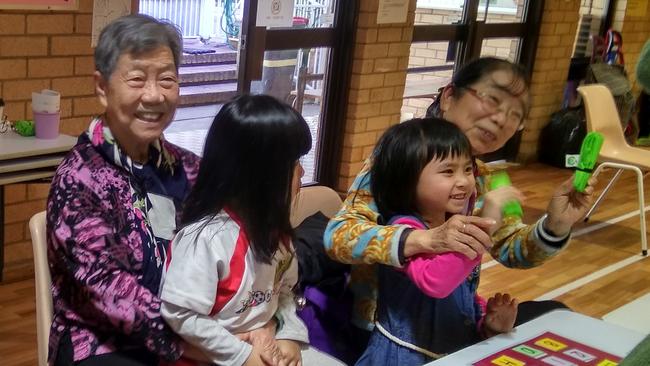Study shows it’s child’s play to stave off dementia
Spending more time with children can help stave off the onset of dementia and keep people healthier for longer, a study has found.

Spending more time with children can help stave off the onset of dementia and keep people — both old and young — healthier for longer, a new study has found.
Research obtained exclusively from the Intergenerational Care Project has found that both older and younger people could benefit from increased interaction, with benefits including a decline in loneliness for older people and an eradication of the “us and them” mentality between generations.
“The intergenerational program is where people learn from one another and we protect social capital,” Anneke Fitzgerald, one of the chief investigators on the project, told The Australian.
“It’s where children tap into the wisdom of older people and perhaps older people tap into the youth, vibrancy and physical activity associated with younger children,” she said.
With funding from the Department of Health’s Dementia and Aged Care Services, Professor Fitzgerald’s team conducted four trials in 2018 to evaluate the business case for mixed aged-care models.
The project is similar to recent televised projects, including the Old People’s Home For 4 Year Olds, a social experiment that brought together elderly people in a retirement community with a group of four-year-olds that aired on the ABC last year.
Professor Fitzgerald and her team from Griffith University found that it could take just two hours a week for older people to boost their mood and for children to improve their wellbeing and confidence if they danced, sang and played together.
“What we imagined when we first started this was an older person first waking up in the morning thinking ‘That’s right, I’ve got to get up — it’s my turn to read to the children’,” she said.
The most effective and cheapest model involved older people and younger people coming together in a shared space, where both groups were already located on the same property.
“The ultimate aim is to build age-friendly societies and to be innovative in the approach,” Professor Fitzgerald said.
“Feedback from an industry partner is that their outlook and the way they view the world after a sincere engagement, doing an activity together with children, actually changed their entire outlook on life,” she said.
Each trial program ran for 16 sessions, where children aged between three and five years met older people for one hour a week. Activities included painting and reading together, singing, cooking and dancing.
“(For older people) the program sparked enjoyment and improved moods and gave them a sense of purpose, all of which may contribute to a delay in cognitive decline. Although a long-term study would need to be conducted to properly measure the effects, cognitively they perk up,” Professor Fitzgerald said.
“For children, we saw a big increase in confidence and also in communication skills and talking about the days and being able to tell stories about the day.”
Evaluation findings suggested the program should be up to 10 weeks and last between one and two hours on a set day to ensure overall optimum improved wellbeing and involvement.
Professor Fitzgerald said the findings of the initial study were promising, but more research into the benefits of mixed aged-care programs was essential to prove they could be one solution to ageing populations.



